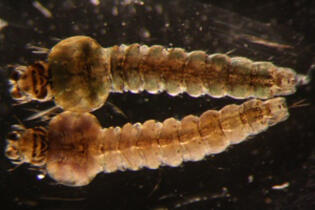
Researchers from LSTM, LSHTM and Durham Universityhave published a Cochrane review entitled: ‘Mosquito larvalsource management: Evaluating evidence in the context of practice and policy’, available August 2013 issue of theCochrane Database of Systematic Reviews.
The first ever review of larval source management (LSM) analysed 13 relevant studies, based in a wide variety of habitats and countries, to determine the effectiveness of LSM for malaria control.
LSM targets the immature mosquitoes, that are found in still bodies of water. Once developed the female (Anopoles gambiae) mosquito is capable of transmitting malaria. By permenantly removing that water, or treating it with larvacidal chemicals, will kill off the larvae and disrupt breeding patterns.
Other recent interventions including widespread bednet distribution and new diagnostics has led has led to a 26% reduction in malaria mortality rates around the world and an estimated 33% drop in Africa alone. However evidence has emerged that mosquitoes are developing resistance to the current generation of insecticide treated nets and this reduction could be short lived. Scientists at LSTM and other international institutions are working on a new generation of insecticides and examining other methods of mosquito control, including larval source management, as a complementary method of mosquito control. With more and more LSM programmes being implemented in sub-Saharan Africa and Asia, there is increased concern over the effectiveness of this method.
The interventions reviewed included adding larvicide to abandoned mine pits, streams, irrigation ditches and rice paddies where mosquitoes breed, and building dams, flushing streams and removing water containers from around people’s homes. The authors found that LSM could be particularly effective in urban areas, rural areas with high population densities or obvious breeding sites like small streams or swamps, highland regions and desert fringes. However, there is a lack of robust evidence on the impact of LSM on parasite prevalence and malaria incidence. Overall, the authors found that LSM can be an effective supplementary measure against malaria in both urban and rural areas of Africa and Asia – wherever it is possible to target a sufficient proportion of mosquito breeding sites.
A WHO spokesperson said: "Until there is more compelling evidence, larval control should continue to be viewed as a supplementary measure for malaria control in carefully selected settings. Promoting the widespread use of larval source management in rural areas of sub-Saharan Africa would be premature."